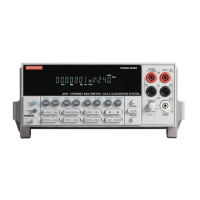Model 2701 User’s Manual Basic DMM Operation 3-11
Volts measurement procedure
NOTE Make sure the INPUTS switch is in the correct position. To use front panel
inputs, it must be in the “F” (out) position. For switching modules, it must be in
the “R” (in) position.
1. If a switching channel is presently closed (displayed), press OPEN to open it.
2. Select the volts measurement function by pressing DCV or ACV.
3. Use the RANGE and keys to select a measurement range consistent with the
expected voltage or press AUTO to select autoranging (AUTO annunciator turns
on). Details on range are provided in Section 4.
4. Apply the voltage(s) to be measured.
CAUTION Do not apply more than maximum input levels indicated in
Figure 3-2
and Figure 3-3 or instrument damage may occur. The voltage limit is
subject to the 8 ××
××
10
7
VHz product.
Model 7700 switching module — The maximum allowable voltage is
300V DC or 300V RMS (425V peak) for AC waveforms. Exceeding
these limits may cause damage to the switching module.
WARNING If both the front panel terminals and the switching module terminals
are connected at the same time, the test leads must be rated to the
highest voltage that is connected. For example, if 1000V is connected
to the front panel input, the test lead insulation for the switching
module must also be rated for 1000V.
5. If using a switching module, perform the following steps to close the desired
channel:
a. Press the CLOSE key.
b. Use , , , and to key in the channel number and press ENTER. The
previously closed channel (if there is one) will open and the specified channel
will close.
NOTE While in the normal measurement state, you can use the
and keys to close
channels. In general, each key press will open the presently closed channel and
then close the next higher or lower channel.
6. Observe the displayed reading. If the “OVERFLOW” message is displayed, select
a higher range until a normal reading is displayed (or press AUTO for
autoranging). For manual ranging, use the lowest possible range for the best
resolution.
7. To measure other switching channels, repeat steps 5 and 6.
8. When finished, press OPEN if there is a channel closed.

